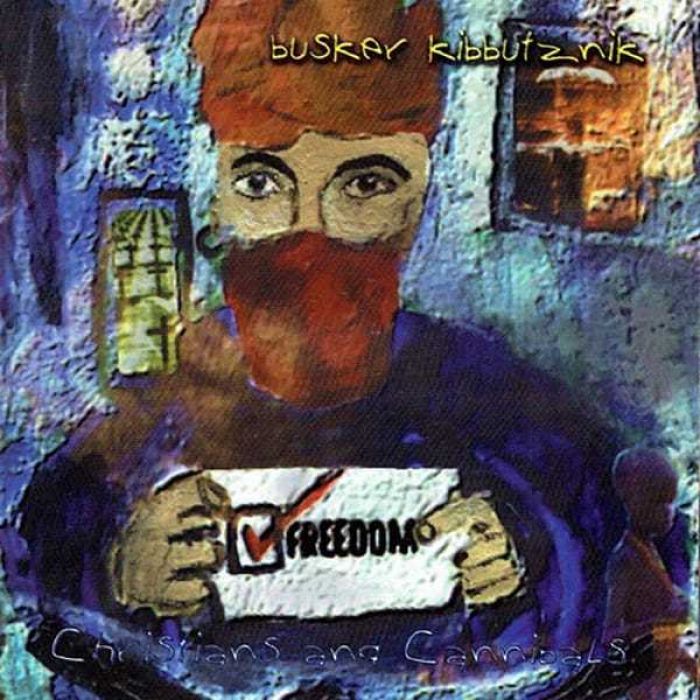Christians and Cannibals by Busker Kibbutznik (Review)

One of the more interesting shows that I caught at Cornerstone this year occurred after midnight about halfway through the fest. At least, I think it happened. It may have all been a dream, induced by the exhaustion of the day’s activities and emotionally draining series of shows. Whatever it was, I saw a stage crowded with people playing all manner of instruments, from guitar to hand drums, didgeridoo to Tibetan singing bowls, trash cans to flutes. Mixed in with the strange instrumentation was a sort of spoken word, the kind one might recite after ingesting the works of A.W. Tozer, T.S. Eliot, C.S. Lewis, and Dr. Seuss. Strange chants and voices filled the air, and they proclaimed the name of the ensemble as Busker Kibbutznick.
Well, I guess it couldn’t have been a dream because I’m listening to the CD as I write this review. But their performance certainly had a bizarre, abstract quality to it. I would call it “avant-garde” or “experimental,” but there’s a certain earthiness to it all that doesn’t jive with an “artsy-fartsy” image. And those words don’t really capture the real diversity of the group. The band themselves label their musical stew as “aboriginal world-beat electrified Celtic Slavic spoken word,” and believe it or not, that jumble of acronyms comes as close to describing their sound as anything I’ll write. Well, they did leave out a few, like “middle-eastern,” “oriental,” and whatnot, but you get the idea.
Whatever genre you might lump this CD in, be it “experimental,” “world-beat,” or whatever, there’s certainly a diverse mix. All of the songs have a tribal quality to them, driven by drums and various forms of percussion from all over the world. It’s a deep, rhythmic sound that’s then interspersed with all manner of strings, wind instruments, guitar noises and drones, chanting, sitars, dulcimers, and some instruments the band probably just made up (like the “Percussive Violence Chamber”).
No less than 18 individuals are credited with the performances here. Usually this doesn’t hinder the album. Rather, it makes for a deep and richly layered recording. The instrumentation rarely stumbles over itself or feels claustrophobic. Even with 18 people, they know how to show plenty of artistic restraint and it shows. Their version of “We Three Kings,” entitled “Wang San,” is as hallucinatory as it is influenced by middle-eastern music, which is to say a lot. It then flows into “Magnificat,” which takes the “We Three Kings” refrain and throws in Renaissance Fair-esque folk melodies and Cantonese vocals.
When I saw Busker Kibbutznick, the one element of their performance that felt out of place was the spoken word. I’ll admit I’m not normally a fan of spoken word to begin with, but during the performance, it seemed really distracting. And not just the spoken vocals, but the writing in general. On the CD, it’s not quite so bad because the music makes up for it. While it reminds me of Steve Scott at times, Buzker Kibbutznick’s poetry never seems to connect or grab me. Steve Scott’s images are often compelling and memorable. However, the poetry on this CD feels too much like a “free jazz” version of Christian mysticism.
Images and metaphors abound, but I’m hard-pressed to really understand what they’re talking about with lines like “If I had a lightbulb and a hairless chihuahua, I’d put them in a closet” (“Light in a Closet”). Throwing in a reference to Plato’s cave doesn’t help too much either. Maybe I just need to read more philosophy. And it’s a shame too, because I know that they’re not just trying to throw together the most abstract images they can think of in an effort to make something that “sounds” profound. I’m sure there’s a rhyme and reason to it, but I just don’t like the feeling that I need a “Cliff’s Notes” in order to understand what the heck they’re talking about. And also, if any of the band might read this review, please try to keep the faux pirate-speak (“Coventry Kaddish”) down to a minimum on the next recording. I don’t know what kind of effect you were trying to achieve, but, well, it just sounds silly.
However you look at it, Busker Kibbutznick is still quite an interesting project. The closest comparison I can come up with is Psalters, since both share common musical threads from all over the globe. But at times, I also hear strands of Dead Can Dance, Godspeed You Black Emperor!, The Revolutionary Army of the Infant Jesus, and even some of those tapes I listened to in my World Music class. Despite the spoken word element, I challenge you to find a more diverse and eclectic release that’s as listenable and engaging as Christians and Cannibals.